Updated November, 2020
Touring connotes long days in the saddle, and that means long days with your head inside your helmet. Fit, then, is going to be of utmost importance when it comes to selecting a touring helmet. A helmet that gives you a hot spot might not be a huge deal when you’re only wearing it for 45 minutes. Over the course of days, though, like an annoying travel companion, an ill-fitting helmet will grow to be a thing you loathe.
Traveling to a brick and mortar store to try helmets on is the best thing you can do, and if that’s not possible then finding an online retailer with a generous return policy is the next best way to go. When you try a helmet on, keep it on for a while too. Minor annoyances that grow large over time can take a while to show themselves.
Anyway, here we scratch the surface with eight touring helmets we’ve either sampled or that come highly recommended from our friends.
Some of our favorite touring helmets are modulars, or flip-front helmets, so see also Best Modular Helmets.
Table of Contents
- Bell Qualifier DLX MIPS $280 - $415
- AGV K6 – $500
- HJC RPHA 70 ST (Grandal graphics shown) approx. $410
- Shark Spartan (Karken graphic shown) $400
- Schuberth R2 (Traction graphic shown) $450
- Scorpion EXO-ST1400 Carbon (Antrim graphic shown) $430
- Shoei GT-Air 2 (Conjure graphics shown), $599
- Arai Regent X (Bend graphic pictured) – $690
Bell Qualifier DLX MIPS $280 - $415
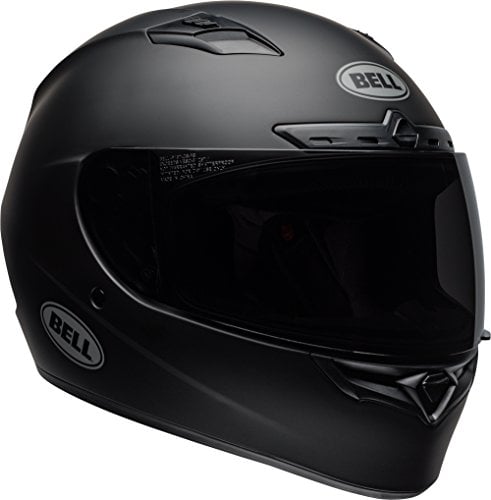
The DLX packs a lot of the features from Bell’s more expensive Stars into an inexpensive lid – ridiculously inexpensive mostly because it comes standard with a Transitions faceshield, which sells separately for around $130 if you’re lucky enough to wear a brand that even offers one. When you’re riding all day and half the night, nothing’s more convenient than not having to change faceshields all the time. Among most of the features you expect, the latest Qualifier is also MIPS-equipped for even better noggin safety. If the DLX fit, you must admit.
AGV K6 – $500
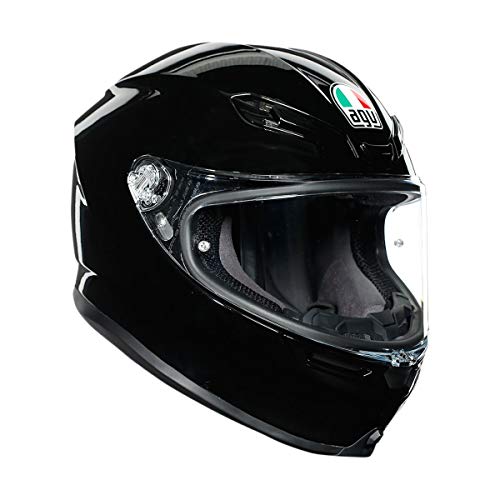
The latest thing from Italy is the culmination of all of AGV’s helmet technology focussed onto a single helmet for street use. A super light carbon and aramid fiber shell is formed into an aerodynamic shape that works well on any kind of motorcycle, and its intermediate oval shape and four sizes deliver an excellent fit for most heads. A plush Ritmo and Shalimar fabric interior is moisture-wicking, removable and quiet, and the K6’s shield is easily swappable. Solid colors start at $499.
HJC RPHA 70 ST (Grandal graphics shown) approx. $410
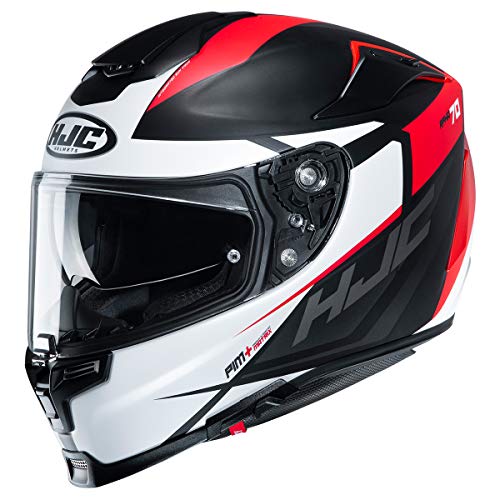
HJC is a Korean manufacturer that’s been in the skidlid business for 47 years, and every time we stick our head in one lately, we’re pleasantly surprised by a level of fit, materials, and lightness that belies the price point. This one’s lightweight carbon fiber/ carbon-glass hybrid fabric shell takes on an intermediate oval shape (Arai’s most popular in North America), and aims to “bridge the gap between sport riding and touring.” It comes with an anti-fog internal sunshield and an antifog insert.
Shark Spartan (Karken graphic shown) $400
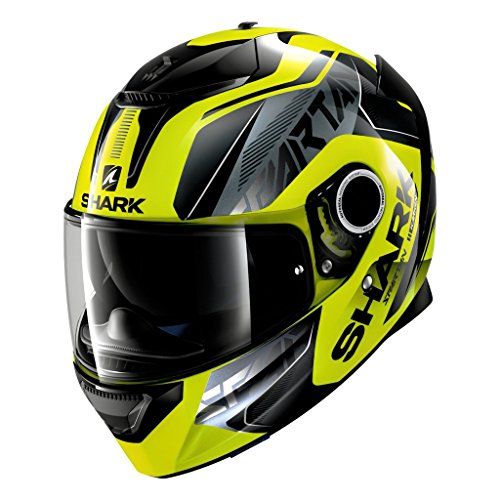
If you like Citroëns, foie gras, and Fabio Quartararo, you’ll also dig Shark’s line of helmets Francais. The Spartan gets great reviews for its lightness and smooth-running aerodynamic shape. “Large ram-air intake vents located on the chin bar and crest channel cool air in while hot air gets expelled out via the venturi created by the twin spoiler design. Your vision will be clear thanks to the MaxVision anti-fog system. Your hearing will be acute since Shark takes a full-system approach to sound damping. Your neck will not strain since the Spartan is both lightweight and volumetrically optimized for drag reduction.”
Schuberth R2 (Traction graphic shown) $450
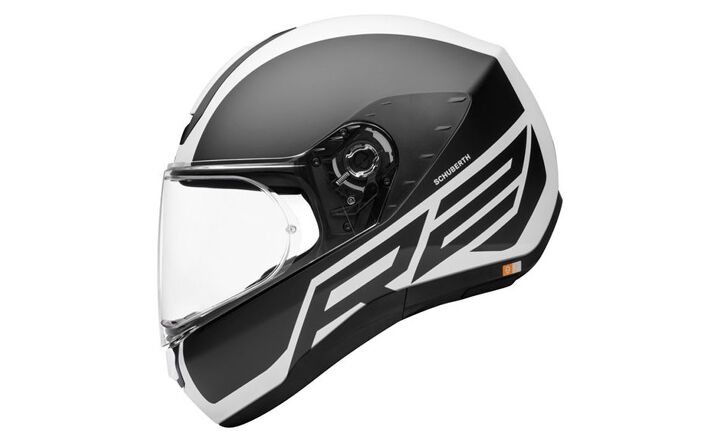
You know how the Germans are. This one’s got “perfected aerodynamics for high-speed stability” and is constructed using an innovative proprietary method called Direct Fiber Processing (DFP), yielding a shell of superior strength that is no thicker in any one area than it needs to be. Inside, we’re inherently antibacterial, washable, and fast-drying, with a seamless headliner and integrated spectacle channel. Further, the R2 is ready to accept the plug-and-play SCHUBERTH SC1-System (sold separately), with integrated antennae, pre-installed speakers and microphone. Pretty cool, really.
Scorpion EXO-ST1400 Carbon (Antrim graphic shown) $430
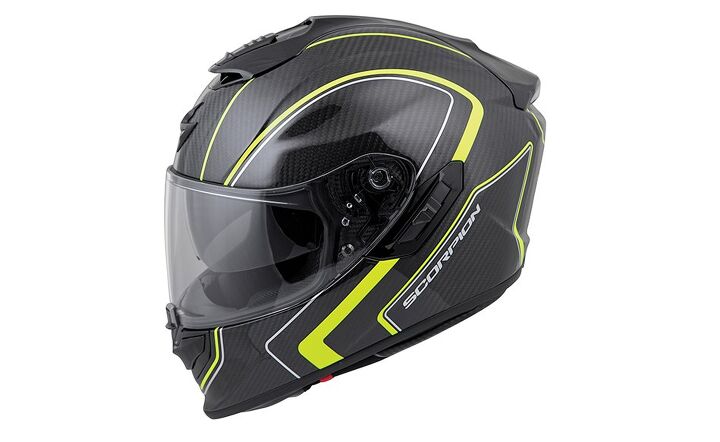
Scorpion makes pretty nice helmets in that midprice range, too. In addition to its light and aero-sculpted carbon shell, the EXO comes with all kinds of features including an internal sun visor and Pinlock insert, as well as at least one thing you won’t find anywhere else: the “AirFit cheek pad inflation system allows you to obtain a personalized fit by pumping the air inflation ball located at the chin bar or near the rear of the helmet. To release the air, simply push the quick-air release. AirFit makes it easy to create a truly tailored helmet fit.”
Shoei GT-Air 2 (Conjure graphics shown), $599
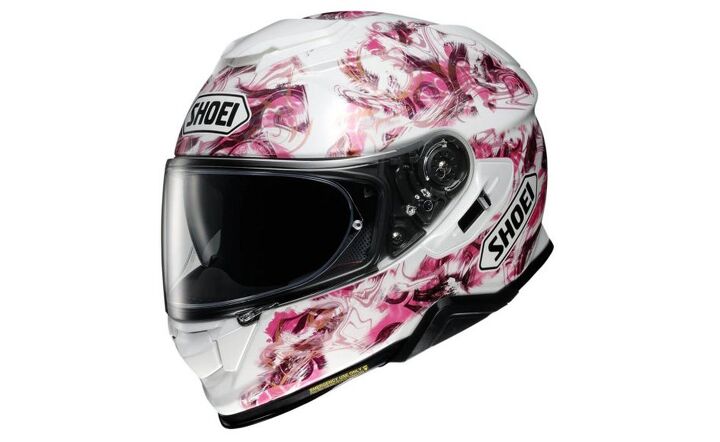
Shoei and Arai are the two premium Japanese-built helmets widely available in the US, and both brands enjoy impeccable reputations for quality and comfort. While Arai offers a bunch of different shapes, Shoei somehow provides many of us an outstandingly comfortable fit with its typical longish-oval shell shape. The GT-Air 2 is SHOEI’s latest premiere full-face touring helmet. It features “a lengthened internal sun shield for optimal sun-glare protection, an all-new ‘first position’ shield opening for advanced ventilation and defogging, enhanced aerodynamics and noise-reduction technology, and the ability to seamlessly integrate with the SENA SRL2 Communication System.”
Arai Regent X (Bend graphic pictured) – $690
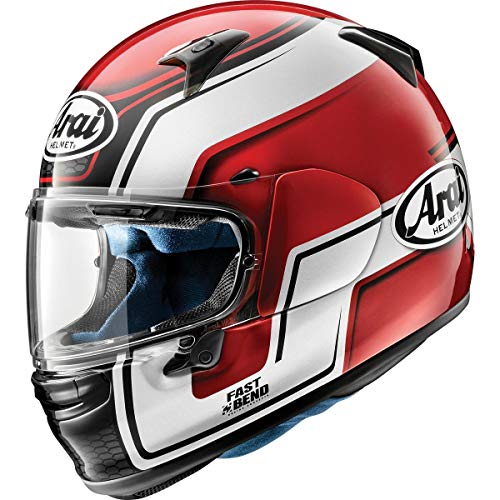
Arai’s reputation is second to none when it comes to helmet safety and quality. Last year the Corsair-X was in this space; this year we’re putting in the new Regent X, which is a lot like the Corsair-X but designed around a new shell with an even smoother shape. The same plush comfort, protection and features expected of the brand is here but also something else – the Regent is much easier to get on and off your head. The new reinforcing Hyper Ridge and VAS shield system lower the center of gravity, and the bottom of the new shell flares out 5 mm to make putting the helmet on easier. It’s a subtle but really noticeable difference that makes the Regent easier to deal with in everyday use and when travelling. Naturally, the Regent still meets Arai’s own safety standards, which surpass both DOT and Snell. And maybe the best news of all is that the price has come down a bit relative to other Arais.
We are committed to finding, researching, and recommending the best products. We earn commissions from purchases you make using the retail links in our product reviews and other articles. Learn more about how this works.
Become a Motorcycle.com insider. Get the latest motorcycle news first by subscribing to our newsletter here.
The post Best Motorcycle Touring Helmets appeared first on Motorcycle.com.
【Top 10 Malaysia & Singapore Most Beautiful Girls】Have you follow?